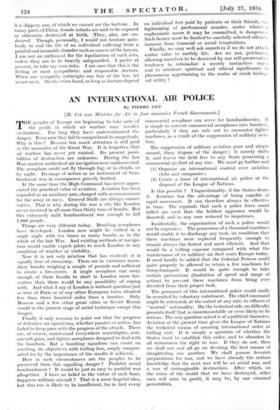AN INTERNATIONAL AIR POLICE
By PIERRE COT
[At. Cot was Minister for Air in four successive French Governments.] THE peoples of Europe are beginning to take note of the perils in which air warfare may involve civilization. For long • they have underestimated the danger. Even now they fail to comprehend its magnitude. Why is this ? Because too much attention is still paid to the memories of the Great War. It is forgotten that air warfare has never yet existed. Its present possi- bilities of destruction are unknown. During the last War, modern methods of air navigation were undiscovered. The aeroplane could not fly through fog, or in clouds, or by night. Its range of action as an instrument of bom- bardment was in consequence gravely limited.
At the same time the High Command has never appre- ciated the practical value of aviation. Aviation has been regarded as an auxiliary arm, charged with reconnaissance for the army or navy. General Staffs are always conser- vative. That is why during the war a city like London never received in all more than thirty tons of bOmbs. But this extremely mild bombardment was enough to kill 1,800 people.
Things are very different today. Bombing aeroplanes have developed. London now might be visited in a single night with ten times as many bombs as in the whole of the last War. And existing methods of naviga- tion would enable expert pilots to reach London in any condition of weather or visibility.
Now it is not only aviation that has evolved ; it is equally true of chemistry. There are in existence incen- diary bombs weighing a couple of pounds and sufficient to create a fire-centre. A single aeroplane can carry enough of these bombs to start in London more fire- centres than there would be any possibility of coping with. And what I say of London is without question just as true of Paris or of any other European town situated less than three hundred miles from a frontier. Only Moscow and a few other great cities in Soviet Russia would in the present stage of aerial technique escape this danger.
Finally it only remaini to point out that the progress of defensive air operations, whether passive or active, has failed to keep pace with the progress of the attack. There are, of course, maintained everywhere searchlights, anti- aircraft grins, and fighter aeroplanes designed to deal with the bombers. But a' bombing squadron' can count on reaching its objectives with trifling loss, amply compen- gated for by the importance of the results it achieves.
How in such circumstances are the peoples to be preserved from this appalling danger ? Prohibit aerial bombardment ? It would be just as easy to prohibit war altogether. I have no belief in the virtue of such bans. Suppress military aircraft ? That is a more hopeful idea, but this too is likely to be insufficient, for in fact every commercial aeroplane can serve for bombardments. It is simple to convert commercial aeroplanes into bombers, particularly if they are safe not to encounter fighter machines, as a result of the suppression 'of military avia- tion.
The suppression of military aviation pure and simple cannot, then, dispose of the danger .; it merely shifts it, and leaves the field free to any State possessing a commercial air:fleet of any size. We must go further and (1) Organize an international control over aviation clubs and companies ; (2) Create a force of international air police at the disposal of the League of Nations.
Is this possible ? Unquestionably, if the States desire it. Aviation has the advantage of being capable of rapid movement. It can therefore always be effective in time. The reprisals that such a police force. could inflict are such that the boldest aggressor would be daunted, and in any case reduced to impotence.
Incidentally, the organization of such a police would not be expensive. The possession of a thousand machines would enable it to discharge any task, on condition that these machines were replaced frequently enough to remain always the fastest and most efficient. And that would be a trifling expense compared with what the maintenance of its military air fleet costs Europe today. It need hardly be added that the Colonial Powers could quite properly be allowed to retain a few machines for troop-transport. It would be quite enough to take certain precautions (limitation of speed and range of action) to prevent these machines from being ever diverted from their proper task.
The personnel of this international police could easily be recruited by voluntary enlistment. The chief command might be entrusted, at the outset at any rate, to officers of "neutral" nationality. On the technical side, no difficulty presents itself that is insurmountable or even likely to be serious. The only question raised is of apolitical character. Aviation at the present time gives the League of Nations the technical means of assuring international order at trifling cost. It is simply a question of whether the States want to establish this order, and to abandon in all seriousness the right to war. If they do not, then we shall one and all go on devising the best means of slaughtering one another. We shalt pursue feverish preparations for war, and we have already' the certain knowledge that the next 'war will be an aerial war, and a war of unimaginable destruction. After which, on the ruins of the world that we have destroyed, other men will arise to profit, it may be, by our criminal perversities.


































 Previous page
Previous page